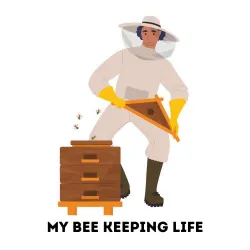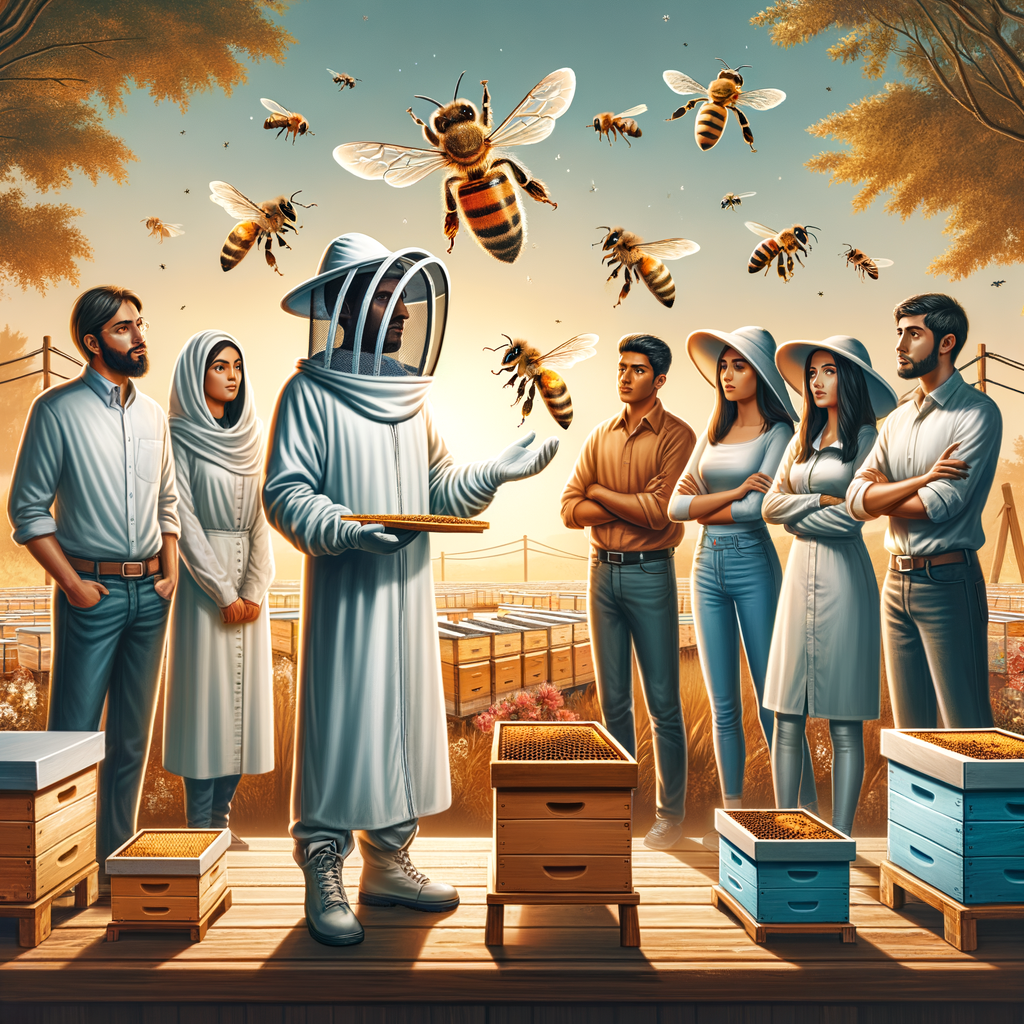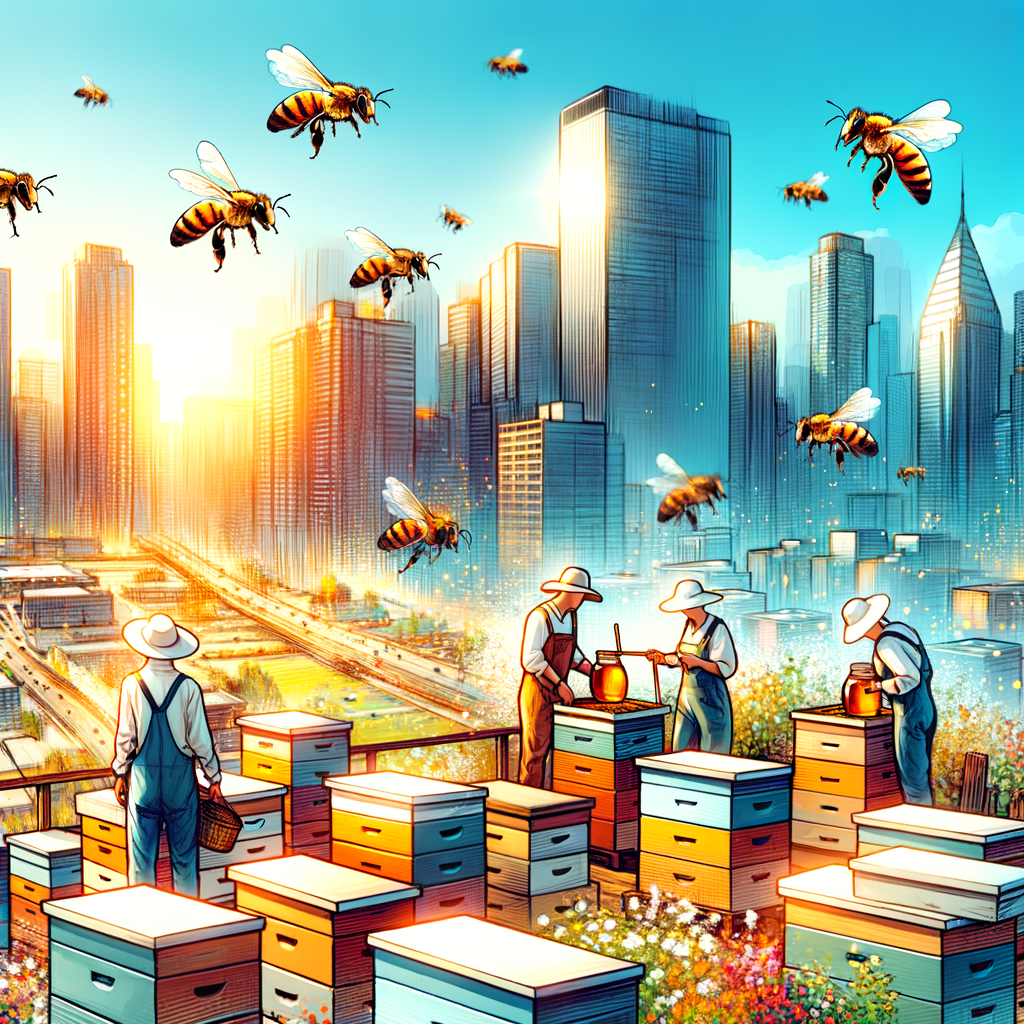
Introduction to Urban Beekeeping
Welcome to the fascinating world of urban beekeeping! This practice is not only a hobby for many city dwellers but also a crucial element in promoting biodiversity and improving our urban food systems. Let’s dive into understanding this concept and its rising popularity.
-
- Understanding the concept of urban beekeeping
Urban beekeeping, also known as urban apiculture, is the practice of keeping bee colonies in urban areas. This can be done on rooftops, balconies, backyards, or any other city spaces where bees can thrive. The main aim is to produce honey and other bee products, but urban beekeeping also plays a significant role in pollination, which is vital for our food production.
-
- The rise of urban apiculture
Urban beekeeping has been on the rise in recent years. This is due to a number of factors. Firstly, there is a growing awareness of the importance of bees for our ecosystem and food supply. Secondly, urban dwellers are looking for ways to reconnect with nature and contribute to their local communities. Finally, the demand for local and organic products, including honey, is increasing.
In the following sections, we will delve deeper into the support for urban agriculture, the role of beekeeping in urban food systems, the challenges and solutions of keeping bees in cities, and the success stories of urban honey production. We will also explore how urban farming and beekeeping can work hand in hand, and what the future might hold for urban beekeeping.
Support for Urban Agriculture
Urban agriculture is a growing trend that is transforming our cities. It’s not just about growing food in cities, but also about community, health, and sustainability. One of the key players in this movement is the humble honeybee.
Role of Beekeeping in Urban Agriculture
Urban beekeeping is more than just a hobby. It plays a vital role in supporting urban agriculture in several ways. Let’s explore two of the most important ones:
-
- Enhancing urban food systems
Beekeeping contributes significantly to urban food systems. Bees are excellent pollinators, and they help in the growth of fruits, vegetables, and nuts. Without bees, our urban gardens and farms would be less productive. According to a study, bees are responsible for pollinating about one-third of the food we eat. This shows how crucial bees are in enhancing our urban food systems.
-
- Supporting local ecosystems
Bees also play a crucial role in supporting local ecosystems. They help in maintaining biodiversity by pollinating a wide variety of plants. This not only benefits the plants but also the other animals that depend on those plants for food and shelter. Furthermore, the honey produced by urban bees is a local and sustainable source of food for the community.
It enhances urban food systems and supports local ecosystems. So, next time you see a bee buzzing around in the city, remember the important role it plays in our urban life.
| Key Role of Bees | Impact on Urban Agriculture |
|---|---|
| Pollination | Enhances productivity of urban gardens and farms |
| Biodiversity | Supports local ecosystems and maintains biodiversity |
| Honey Production | Provides a local and sustainable source of food |
Urban Food Systems and Beekeeping
Urban food systems are a crucial part of our cities. They provide fresh, local produce to residents and help to reduce the environmental impact of transporting food from rural areas. One key component of these systems is beekeeping. Bees play a vital role in our food production, and urban beekeeping can have significant benefits for our food security and sustainability.
- Importance of Beekeeping for Food Security
Beekeeping is much more than just honey production. Bees are some of the world’s most important pollinators. They help plants to reproduce by transferring pollen from the male parts of a flower to the female parts. This process is essential for the growth of many of the fruits, vegetables, and nuts we eat.
Without bees, our food system would look very different. In fact, it’s estimated that one-third of the food we consume each day relies on pollination mainly by bees. Therefore, promoting urban beekeeping can help to secure our food supply by ensuring that these vital pollinators continue to thrive.
- Impact on Sustainable Urban Food Systems
Beekeeping can also contribute to more sustainable urban food systems. Bees not only help to increase food production through pollination, but they also help to improve the quality of our food. Studies have shown that crops pollinated by bees are generally larger and more flavorful than those that are not.
Moreover, urban beekeeping can help to green our cities. Bees need a diverse range of plants to survive, which can encourage urban residents to plant more flowers and trees. This not only provides food for the bees but also helps to improve air quality and create more pleasant urban environments.
By supporting bees, we can help to secure our food supply and create more sustainable, green cities.
Beekeeping in Cities: Challenges and Solutions
Urban beekeeping, while beneficial, presents its own unique set of challenges. However, with the right approach and strategies, these obstacles can be overcome, leading to a thriving urban beekeeping scene.
Challenges in Urban Beekeeping
Urban beekeeping, like any other form of urban agriculture, faces a few significant hurdles. Two of the most common challenges are space constraints and regulatory hurdles.
-
- Space Constraints
Urban areas are often densely populated, with limited open spaces. This lack of space can make it difficult to establish and maintain beehives. Bees need room to fly and forage for nectar and pollen. Without adequate space, bees may become stressed or unhealthy, affecting honey production and the overall health of the colony.
-
- Regulatory Hurdles
Regulations can also pose a significant challenge to urban beekeepers. In some cities, beekeeping may be restricted or even prohibited. These regulations often stem from concerns about public safety or nuisance issues. For instance, some people may be allergic to bee stings, and there may be concerns about bees swarming in public areas. Navigating these regulations can be complex and time-consuming for urban beekeepers.
Despite these challenges, urban beekeeping can be a rewarding and beneficial activity. With the right strategies and community support, these challenges can be overcome.
Solutions for Successful Urban Beekeeping
Urban beekeeping can thrive with the right solutions. Let’s explore two key strategies that can make a big difference: community involvement and policy changes.
- Community Involvement
Community involvement is a powerful tool for successful urban beekeeping. When local people understand the benefits of beekeeping, they are more likely to support it. Bees are not just honey producers; they also play a critical role in pollinating plants. This helps our gardens, parks, and even our food crops to grow.
Community education can help dispel fears about bees and highlight their importance. Workshops, school programs, and community beekeeping projects can all help. For example, in New York City, community gardens often host beehives, and local residents can learn about beekeeping.
Moreover, community involvement can also help in practical ways. Local volunteers can assist in maintaining beehives, and local businesses can sponsor them. This collective effort can make urban beekeeping a community project, benefiting everyone involved.
- Policy Changes
Policy changes can also significantly impact urban beekeeping. Many cities have laws that restrict beekeeping, often due to outdated fears about bees. Changing these laws can open up new opportunities for urban beekeepers.
For instance, in 2010, New York City lifted its ban on beekeeping. Since then, the number of registered beekeepers in the city has increased dramatically. This shows how policy changes can support urban beekeeping.
Policy changes can also include providing support for urban beekeepers. This could be through grants, training programs, or other resources. By making it easier for people to start beekeeping, we can help this important practice to grow.
By working together and making smart changes, we can help bees – and our cities – to thrive.
Urban Honey Production: A Sweet Success
Urban honey production is a growing trend that is not only beneficial to the environment, but also to the economy and the health of the community. Let’s explore the benefits of urban honey production and look at some successful case studies.
- Benefits of Urban Honey Production
Urban honey production has a multitude of benefits. Here are a few:
- Environmental Benefits: Bees play a crucial role in pollination, which is vital for the growth of plants and flowers. By keeping bees in urban areas, we help maintain the balance of the ecosystem.
- Economic Benefits: Urban honey production can be a profitable business. The honey produced can be sold locally, contributing to the local economy.
- Health Benefits: Honey is a natural sweetener that has numerous health benefits. It is rich in antioxidants and can help soothe a sore throat, among other things.
- Case Studies of Successful Urban Honey Production
There are many successful urban honey production stories that can inspire others. Here are two examples:
- The Honeybee Conservancy: This non-profit organization, based in New York City, has been successful in promoting urban beekeeping. They have installed beehives in various locations across the city, including schools and community gardens.
- Bee Urban: This London-based company has made a name for itself by installing and maintaining beehives in urban areas. They work with businesses, schools, and individuals to promote urban beekeeping and honey production.
In conclusion, urban honey production is not just a sweet success; it’s a boon to the environment, the economy, and our health. With the right support and resources, anyone can become a successful urban beekeeper.
Urban Farming and Beekeeping: A Perfect Pair
Urban farming and beekeeping are two practices that go hand in hand. They both contribute to the sustainability of our urban environments, and they complement each other in many ways. Let’s delve into how these two practices work together to create a harmonious urban ecosystem.
- How beekeeping complements urban farming
Beekeeping plays a crucial role in urban farming. Bees are excellent pollinators, and they help to increase the yield of crops. Without bees, many of our favorite fruits, vegetables, and nuts would be much harder to grow. By keeping bees in urban farms, we can ensure that our crops are well-pollinated and productive.
Moreover, bees also produce honey, which can be harvested and sold for additional income. This makes beekeeping a profitable addition to urban farming. Not only does it boost crop production, but it also provides a sweet bonus at the end of the season.
- Examples of urban farming and beekeeping co-existence
There are many examples of successful urban farming and beekeeping co-existence. In New York City, for instance, rooftop gardens often include beehives. These hives help to pollinate the city’s green spaces, and they produce local honey that’s sold at farmers’ markets.
In Detroit, urban farms have embraced beekeeping as a way to revitalize vacant lots. These farms provide fresh produce for local residents, and the bees help to increase crop yields. Plus, the honey produced by these urban bees is a unique product that’s highly sought after by local foodies.
These examples show how urban farming and beekeeping can co-exist and thrive in an urban environment. They demonstrate that with a bit of creativity and commitment, we can transform our cities into productive and sustainable ecosystems.
In conclusion, urban farming and beekeeping are a perfect pair. They complement each other in numerous ways, and they both contribute to the sustainability and productivity of our urban environments. By embracing these practices, we can create healthier, greener cities for everyone to enjoy.
Conclusion: The Future of Urban Beekeeping
As we wrap up our discussion on urban beekeeping, it’s crucial to look ahead and envision what the future holds for this vital sector of urban agriculture. The future of urban beekeeping is bright, with continued growth and support expected from various quarters.
- Continued growth and support for urban beekeeping
Urban beekeeping is on the rise. More and more city dwellers are embracing the practice, recognizing not only its economic benefits but also its contribution to biodiversity and the environment. This growth is expected to continue, driven by increasing public awareness and support from local governments and organizations.
For instance, many cities are now adjusting their zoning laws to accommodate urban beekeeping, while others offer educational programs and resources for aspiring beekeepers. This growing support is a positive sign for the future of urban beekeeping.
- Key takeaways for aspiring urban beekeepers
If you’re considering joining the ranks of urban beekeepers, there are a few key takeaways from our discussion that you should keep in mind.
Firstly, education is key. Before you start, learn as much as you can about bees and beekeeping. This will help you understand the challenges involved and how to overcome them.
Secondly, remember that beekeeping is a commitment. Bees require regular care and attention, so be prepared to invest your time and effort.
Lastly, don’t be discouraged by the challenges. Yes, urban beekeeping has its difficulties, but the rewards – from the sweet honey to the satisfaction of contributing to your local ecosystem – are well worth it.
With continued growth and support, and with more individuals understanding the importance and benefits of this practice, we can look forward to a future where cities buzz with the sound of bees, and urban honey becomes a staple in every home.








